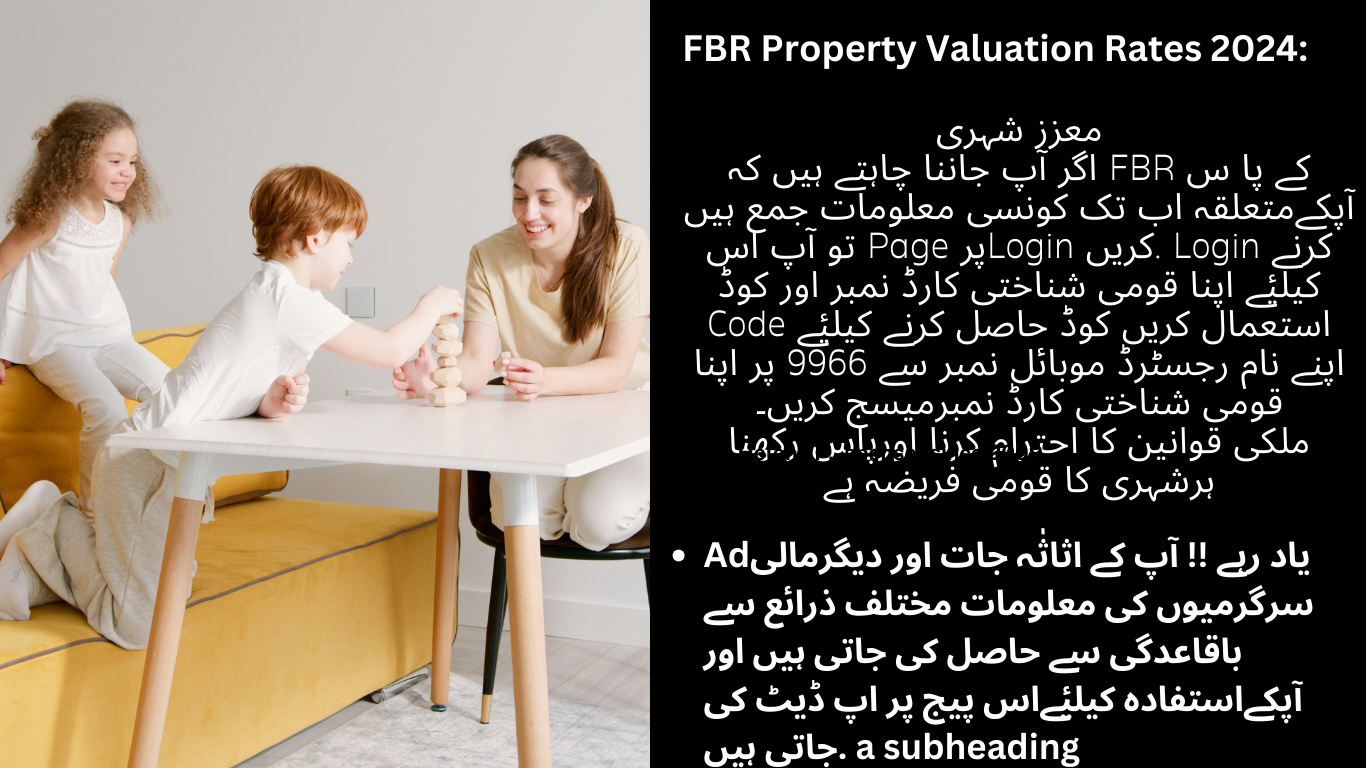FBR Property Valuation Rates 2024: A Complete Guide for Property Owners, Buyers, and Sellers
If you’re involved in buying, selling, or owning property in Pakistan, you’ve probably heard about FBR property valuation rates. These rates, set by the Federal Board of Revenue (FBR), play a crucial role in determining property taxes, stamp duties, and other legal fees. But what do the FBR property valuation rates 2024 mean for you? Whether you’re a homeowner, investor, or developer, this guide will break down everything you need to know in simple, easy-to-understand language.
In this blog, we’ll cover:
- General FBR Property Valuation Rates 2024
- City-Specific FBR Property Valuation Rates 2024
- Property Type-Specific FBR Valuation Rates 2024
- Tax and Legal Implications of FBR Valuation Rates 2024
- Stakeholder-Specific FBR Valuation Rates 2024
- Special Cases and Property Scenarios
By the end of this post, you’ll have a clear understanding of how these rates impact you and what steps you can take to navigate the system effectively. Let’s dive in!
What Are FBR Property Valuation Rates?
FBR property valuation rates are the official rates set by the Federal Board of Revenue to determine the value of properties for tax purposes. These rates are used to calculate:
- Property taxes
- Capital gains tax
- Stamp duty
- Withholding tax
The FBR updates these rates annually to reflect changes in the real estate market. The 2024 rates are particularly important because they affect property transactions, taxes, and legal fees for the entire year.
General FBR Property Valuation Rates 2024
The FBR property valuation rates 2024 have seen some significant updates compared to previous years. Here’s what you need to know:
Key Updates for 2024
- The FBR has increased valuation rates in most major cities to align with rising property prices.
- A new online calculator has been introduced to help property owners estimate their taxes accurately.
- The FBR has also released a detailed valuation table for different types of properties.
How Do FBR Rates Compare to Market Rates?
One of the most common questions is: How do FBR rates compare to actual market rates? In most cases, FBR rates are lower than market rates. This discrepancy can lead to disputes between buyers and sellers, especially when calculating taxes or transfer fees.
For example, if the market value of a property is Rs. 10 million, the FBR valuation might only be Rs. 7 million. This difference can save you money on taxes but may also cause complications during property transactions.
City-Specific FBR Property Valuation Rates 2024
FBR property valuation rates vary significantly depending on the city. Here’s a breakdown of the 2024 rates for some of Pakistan’s major cities:
Islamabad
- Residential properties: Rs. 10,000–50,000 per square yard
- Commercial properties: Rs. 20,000–80,000 per square yard
Lahore
- Residential properties: Rs. 8,000–40,000 per square yard
- Commercial properties: Rs. 15,000–70,000 per square yard
Karachi
- Residential properties: Rs. 7,000–35,000 per square yard
- Commercial properties: Rs. 12,000–60,000 per square yard
Other Cities
- Rawalpindi, Faisalabad, Multan, Peshawar, Quetta, Gujranwala, Hyderabad, and Sialkot also have their own specific rates, which are generally lower than those in major metropolitan areas.
Property Type-Specific FBR Valuation Rates 2024
The FBR sets different valuation rates for various types of properties. Here’s how the 2024 rates break down:
Residential Properties
- Includes houses, apartments, and plots.
- Rates vary based on location, size, and amenities.
Commercial Properties
- Includes shops, offices, and warehouses.
- Rates are typically higher than residential properties.
Agricultural Land
- Rates are lower compared to urban properties.
- Valuation depends on the location and fertility of the land.
Industrial Properties
- Includes factories and manufacturing units.
- Rates are determined by the size and location of the property.
Tax and Legal Implications of FBR Valuation Rates 2024
Understanding the tax and legal implications of FBR valuation rates is crucial for property owners and buyers. Here’s what you need to know:
Property Taxes
- FBR rates are used to calculate annual property taxes.
- Higher valuation rates mean higher taxes.
Capital Gains Tax
- If you sell a property, the FBR rate determines your capital gains tax.
- The tax is calculated on the difference between the purchase price and the sale price.
Stamp Duty and Registration Fees
- These fees are based on the FBR valuation of the property.
- Higher valuation rates mean higher fees.
Inheritance Tax
- Inherited properties are also subject to FBR valuation rates.
- The tax is calculated based on the value of the inherited property.
Stakeholder-Specific FBR Valuation Rates 2024
Different stakeholders are affected differently by FBR valuation rates. Here’s how:
Buyers
- Higher FBR rates mean higher taxes and fees.
- Buyers should factor these costs into their budget.
Sellers
- Sellers may face disputes with buyers over valuation differences.
- It’s important to disclose the FBR valuation upfront.
Investors
- Investors need to consider FBR rates when calculating returns on investment.
- Lower FBR rates can mean higher profits.
Developers
- Developers must account for FBR rates when pricing new projects.
- Higher rates can increase development costs.
Special Cases and Property Scenarios
FBR valuation rates also apply to special cases and scenarios. Here are some examples:
NOC Properties
- Properties with no objection certificates (NOCs) are valued differently.
- The FBR considers the NOC status when determining the rate.
Disputed Properties
- Disputed properties may have lower valuation rates.
- The FBR takes into account the legal status of the property.
Inherited Properties
- Inherited properties are valued based on the FBR rate at the time of inheritance.
- The valuation may differ from the market rate.
Leased Properties
- Leased properties are valued based on the lease terms.
- Long-term leases may result in higher valuations.
Conclusion
The FBR property valuation rates 2024 are a critical factor for anyone involved in Pakistan’s real estate market. Whether you’re buying, selling, or owning property, understanding these rates can save you money and help you avoid legal complications.
By staying informed about the latest updates, city-specific rates, and tax implications, you can make smarter decisions and navigate the system with confidence. If you have any questions or need further assistance, feel free to reach out to a real estate expert or tax consultant.




